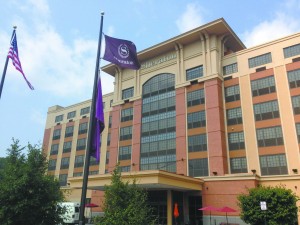Much to the delight of hotel owners and to the dismay of town officials, Gov. Andrew Cuomo has vetoed a series of bills that would have created a 3 percent hotel occupancy tax in 13 Westchester municipalities. The tax would have been in addition to a 3 percent tax already imposed by the county.
The six bills that were approved earlier this year by state lawmakers included the villages of Harrison, Tuckahoe, Mamaroneck and Port Chester as well as the towns of Greenburgh and North Castle. The Greenburgh bill included hotels in the incorporated villages of Ardsley, Dobbs Ferry, Elmsford, Hastings-on-Hudson, Irvington and Tarrytown.
Also included in the veto was a bill that would have imposed a 5 percent bed tax in Woodbury.
State lawmakers originally approved the bills before the close of the 2015 legislative session this past summer.
In his veto message, Cuomo cited Rye Brook as the lone, rare instance where a village was approved for a hotel occupancy tax. Former Gov. David Paterson authorized that bill in August 2010, which Rye Brook Mayor Paul S. Rosenberg estimated brought in $552,000 for the village the past fiscal year.
“The Legislature has historically advanced occupancy tax bills only for counties and cities, except in one unique circumstance in the past,” Cuomo said. “If there is to be a policy change on this issue, it should be done pursuant to a comprehensive and determinative statewide policy as advanced by the Legislature.”
“If the Legislature sets such a policy, I will commit to reconsidering this issue.”
Hotel owners and managers opposed the bill because of the potential impact on guests, who they said may instead stay in neighboring areas like Fairfield or Rockland counties, which don”™t have a bed tax. Several village and town officials lobbied for an occupancy tax because the money raised would offset any potential hike in property taxes.
Greenburgh Town Supervisor Paul Feiner, a Democrat who has supported a local occupancy tax for six years, expressed disappointment with the decision. In a statement, Feiner said the tax from Greenburgh”™s roughly 2,000 hotel rooms would have generated $1 million for the town annually, which could have funded road repaving projects.
“We”™re obviously disappointed,” Feiner said. “In my opinion it doesn”™t make sense for New York state to authorize the tax for some communities in Westchester and the state ”“ but not others.”
“On the positive side,” he said, “the governor”™s office indicated that they will work with local governments and the state Legislature and will try to find ways to help communities come up with additional revenues during the next legislative session.”
Those who have opposed the bill include Rich Friedman, general manager at the DoubleTree by Hilton in Tarrytown, who told the Business Journal in July that it would put his hotel at a “competitive disadvantage” because of the lack of a similar tax in other Westchester municipalities also home to hotels. Officials from The Business Council of Westchester previously expressed concern that conference organizers could be turned off by the additional 3 percent tax.
The Westchester Hotel Association, which represents 50 hotels in the county, also wrote a series of letters to Cuomo this year urging him not to sign the bills.
The state Legislature has previously approved local hotel taxes for the cities of White Plains, New Rochelle and Rye. Cuomo authorized a similar bed tax for Yonkers earlier this year.
The legislation vetoed by Cuomo was sponsored by state Sen. Andrea Stewart-Cousins, a Democrat representing Yonkers, and Assemblyman Thomas Abinanti, a Democrat who represents Greenburgh and Mount Pleasant.
In a statement released Dec. 30, Abinanti said he was disappointed with the veto.
“I worked hard with our communities to establish a new, reoccurring revenue stream that would have provided relief to our local property taxpayers,” he said.
“Unfortunately, this veto furthers the agenda of corporate special interests who try to avoid making a fair contribution to the communities where they are located and who lobbied against this legislation. At the same time, the hardworking property taxpayers of Greenburgh and Sleepy Hollow lost an opportunity for some tax relief.”

















Senator Latimer pushed hard for these new taxes too. He must be disappointed he couldn’t deliver for the people. But most of us realize these taxes were just to avoid the tax cap. Thanks Andrew and boo to George and Andrea.